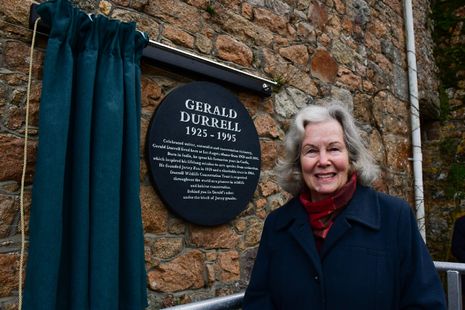Lee Durrell on the lost ideal of the ‘gentleman naturalist’
Seyan Dattani sits down with the conservationist and widow of Gerald Durrell to discuss his legacy

Lee Durrell, conservationist and widow of the late pioneering naturalist, author and zoo director Gerald Durrell, has always been an “animal person”. She muses that “some people are born with an innate affinity for the natural world.” It goes without saying that both Lee and her late husband have this quality in spades. One of Lee’s earliest memories is of capturing a frog in her garden to observe with her grandfather. This cherished memory laid the foundations of her remarkable career in wildlife conservation.
After reading Philosophy as an undergraduate, Lee undertook a PhD in ultrasonic communication in mouse lemurs at Duke University. Her fieldwork on the acoustic community in a Madagascan forest did, however, face slight disruption in the form of a military coup, which delayed her return to America by six months.
It was during a dinner party back at Duke that Lee first met her future husband. She vividly remembers their first encounter. “In walked this man in a powder blue suit with flowing white hair and the brightest blue eyes you’ve ever seen. The whole room lit up with a thousand megawatts of personality…I was just dumbfounded.” A few months later, Gerry invited Lee to his zoo in Jersey, claiming that he’d been left some money by a “little old lady” and that he wanted Lee’s advice on setting up a sound recording laboratory. When she flew out, Lee discovered that the lovestruck Gerry had lured her to the island under somewhat false pretences. “It was a complete fabrication – there was no little old lady!” she laughs. Nevertheless, a romance quickly blossomed and the pair married in 1979. “You don’t normally meet your heroes, but you certainly don’t get to marry them,” she concludes wryly.
“some people are born with an innate affinity for the natural world”
Gerry’s most famous book, My Family and Other Animals, was a core text in English classrooms for many years. Set amongst the sun-dappled olive groves of Corfu, it tells the story of Gerry’s bucolic childhood – a seemingly bygone era where mantises lurked in every myrtle bush, and tortoises plodded across heather-topped hills. What is it about his works that still resonates in the grey, digital world of the 21st century? “They’ve got a little bit of everything – humour, animals, interesting people and a really strong sense of place.” As for literary inspirations, Lee says that Gerry, like his brother and fellow author Lawrence Durrell, was a “voracious” reader. “He loved [P.G.] Wodehouse,” Lee remembers. She cites lively books on the lives of insects by the French entomologist, Jean-Henri Fabre, as one of the greatest literary influences on her late husband’s work.
Gerry’s founding of Jersey Zoo in 1959 was, according to Lee, a watershed moment. “It was the first time someone had set up a zoo devoted to the conservation and breeding of endangered species,” she tells me. She adds that Gerry was “always keen” to prioritise what he affectionately termed “little brown jobs” – overlooked and often undervalued species including the pygmy hog or ploughshare tortoise. The Durrell Wildlife Conservation Trust, founded four years later, helped to save many such “little brown jobs” from extinction.
In response to Gerry’s conservation efforts, zoos everywhere quickly began to cite conservation as a key priority. Nonetheless, Lee doesn’t feel that the actions of most zoos always match their new rhetorics and she particularly criticises the lack of ambition to showcase rare and unusual species. “I don’t think you have to have the box office species,” Lee says, “it’s all about how you market things.” She does concur that some zoos are unquestionably getting it right. She recently gave a talk at Chester Zoo on the critical importance of saving species from extinction. She affectionately refers to the zoo as “New Jersey,” both for the sheer number of ex-Durrell staff who work there as well as the zoo’s commitment to importing and breeding little-known species. She particularly approves of Chester’s conservation programmes for Bermuda’s endangered snails and skinks, calling it “typical Durrell stuff”.
“I don’t think you have to have the box office species”
Jersey Zoo has recently been criticised for replacing endangered species with crowd pleasers. How does Lee think that the zoo will evolve over the coming years? She maintains that Jersey is still famous for its “little brown jobs” and will continue to focus on endangered groups such as lemurs, Asian songbirds and South American primates – citing a planned new tropical exhibit (to replace the 1970s Reptile House) as a prime example of this direction.
Though Gerald Durrell passed away in 1995, 2025 marks the centenary of his birth, something Lee is keen to celebrate. Festivities include a themed fundraising ball at Jersey and a play and musical performance in Corfu (whose municipal gardens were named after the Durrell family in 2004).
As a passionate amateur with no formal qualifications in zoology, Gerry represented a now endangered ideal of the ‘gentleman naturalist,’ shaped by luminaries including Charles Darwin and Peter Scott. Today, only the stalwart Sir David Attenborough seems to continue in their wake. “They don’t make them like they used to,” Lee muses wistfully.
Gerald Durrell was one of the most charismatic champions the natural world has ever had. In an age where conservation efforts are ruled by spreadsheets and meetings, the blend of curiosity, humour, and heartfelt conviction that Lee describes seem rarer than ever – and all the more worth remembering.
 News / Colleges charge different rents for the same Castle Street accommodation2 March 2026
News / Colleges charge different rents for the same Castle Street accommodation2 March 2026 News / King’s hosts open iftar for Ramadan3 March 2026
News / King’s hosts open iftar for Ramadan3 March 2026 Theatre / Lunatics and leisure centres 4 March 2026
Theatre / Lunatics and leisure centres 4 March 2026 News / Angela Merkel among Cambridge honorary degree nominees27 February 2026
News / Angela Merkel among Cambridge honorary degree nominees27 February 2026 News / News in Brief: waterworks, wine woes, and workplace wins 1 March 2026
News / News in Brief: waterworks, wine woes, and workplace wins 1 March 2026








